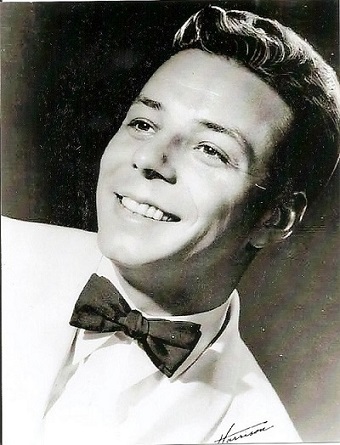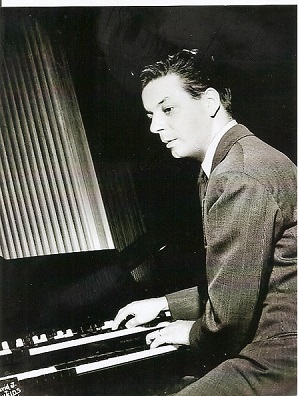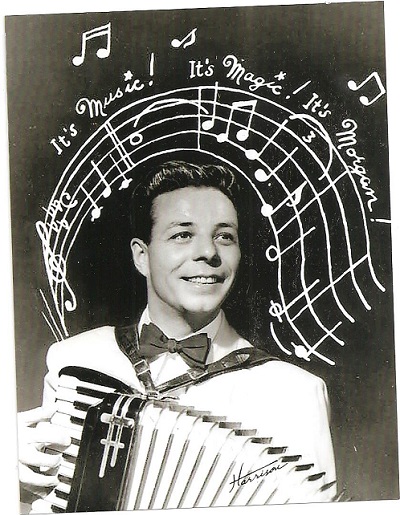

Biography of Clarke Morgan
Written by Dan Ahearn.
Clarke Morgan was born in Maunie, Illinois on April 20, 1914, the 2nd of four children. He was named Grover Wilson Morgan, called Wils by his family, but later selected Clarke Morgan as his professional name. As I suspected long before, his gracious daughter Margaret (Peggy) confirmed a few years ago, that Clarke possessed an extremely high intellect, actually genius level. He skipped several grades and was in medical school at a very young age but after his first year at the University of Southern Illinois, he realized his career would be music or nothing.
On July 30th, 1935 he married Elsie Faner and moved to St. Louis MO. where he worked as staff musician at Radio Station KMOX. He also performed nightly at various hotels in that area.
His daughter Peggy was born on April 7, 1938 and soon after the family moved to Erie, PA where he gave classical music recitals and played at some clubs around town. Then they moved to New York City where he played piano, organ and accordion in the cocktail lounge of The Lombardi Hotel and occasionally played with the soon to be very famous Liberace.
In 1943, during the height of World War II, Clarke was drafted. After the war he returned to New York to resume his career, performing in clubs, writing songs and in the late forties was the musical director for the radio soap opera, "Wendy Warren and the News." The theme he composed for this show, entitled “Our Town” was so popular it had to be released as sheet music, the first and I believe only time this has happened. Before ANOTHER WORLD he would do the music for one of the first television soaps, “The First Hundred Years” and later “Golden Windows” and “From These Roots."
It is utterly astonishing to me that so few people recognized the extent of his talent and that he never achieved world-wide fame given how his unique style of playing background music set him apart so vividly from all the other organists in daytime TV at the time. This is not said to detract from the level of talent of other fine musicians such as Charles Paul and Paul Taubman but Clarke added an additional dimension as vast as time and space to the musical direction of each episode of ANOTHER WORLD.
This is largely because he actually scored each episode, as one would a movie, with perfectly timed and accentuated organ music at the beginning, very often during, and at the end of each act. Most noteworthy and memorable were the breathtakingly beautiful leitmotifs or melodies that he composed for each female character or male-female couple. They were so well thought-out that they truly embodied and captured the essence of each character.
When I first began watching ANOTHER WORLD in December of 1966, I almost immediately noticed this and began to commit each theme to memory as I became aware that each note he played was an inherent component of the temperament, personality, and current mind-set of each character. His absolutely exquisite theme for Melissa captured her fragile nature and her inherent, almost saintly goodness. The nagging, frenetic theme for meddlesome Aunt Liz provided a fabulous soundtrack for her as she swirled about in her path of tornadic destruction. Lenore’s mellifluous tune reflected this high society character’s grace, poise and breeding. Mary Matthews’ benevolence, Rachael’s self-centered flightiness, Alice’s light-heartedness (in the early days) and Pat Randolph’s dignified serenity (despite all her turmoil) were all encapsulated musically with astonishing brilliance. Clarke used the Hammond organ as a canvas onto which he projected each character’s personality traits with musical notes in the same manner as a portrait painter replicated a person’s facial characteristics in oils.

And then we must consider the matter of his fade-out chords. Here his talent radiated even more brilliantly, if that is possible. In June of 1968, I received a reel to reel tape recorder for my birthday. I began taping the portions of the show where his music played in each scene (This was fortunate since, for the most part, it is all that remains of his work on the show since the powers-that-be inexplicably decided to erase all of the tapes of the show). This was when I noticed his fade-out chords and how he could musically capture every nuance of emotion and in essence set to music the expressions on the character’s faces. Any emotion: terror, grief, jealousy, confusion, defiance, chagrin, elation, rage...the entire gamut of human emotion could emanate from his keyboard.
Regrettably, present day opinion might consider his organ music, and that of the others, trite or even corny and maybe in the hands of much less talented organists it might be, but with Clarke Morgan, I think not. Just a few years after Clarke’s untimely death, soap opera had completely abandoned organ music in favor of the dreary, pre-orchestrated version of pre-taped background music. The organ music was the life’s blood of the soap opera and the elimination of this live format was the first nail in its coffin. It was just the first of many aspects of their unique identity as an original American art form to be sacrificed until they became what the four that remain on the air are now; nothing more than prime time shows on in the daytime bearing no resemblance to all the great soaps I watched so many years ago. The “slice of life” realism has been replaced with utterly ridiculous storylines often containing absurd supernatural elements, and the once refined, dignified matriarchs and ingenues now behave like Amazons.
Needless to say Clarke’s death was a major loss to ANOTHER WORLD although the storyline remained quite strong. The loss of Clarke on December 28th, 1968, Agnes Nixon as writer earlier that year, and in 1969, the death of the Lee Randolph character and the departure of Audra Lindley as Aunt Liz and Joseph Gallison and Carol Roux as Bill & Missy all combined to make 1969 the beginning of the end of the golden age of ANOTHER WORLD.
Clarke’s music has been an omnipresent part of my life for over fifty years now. Not a day has gone by that I have not found myself recalling one of his rapturously beautiful melodies and I am frequently transported back to those thrilling afternoons of the late 1960’s when I could not wait to be enchanted by one beautiful melody after another or mesmerized by the intensity of his accompaniment as the screen faded to black.
Daniel Ahearn
December 31, 2018
